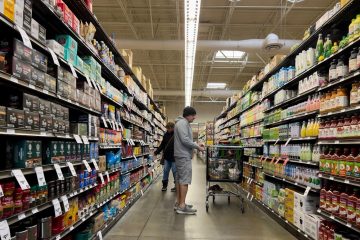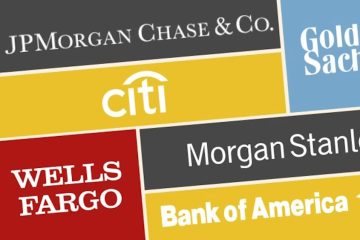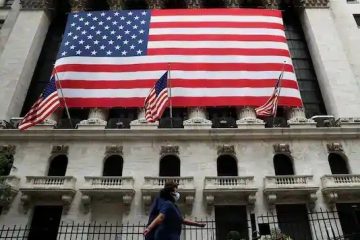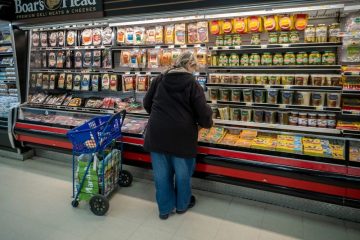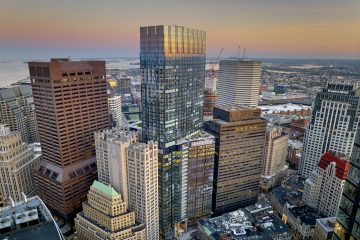The Economist: Finance & economics
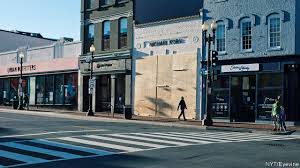
COUNTY IN New York, outside the city and Long Island, has seen more cases of covid-19 than Westchester, just north of the Bronx. For weeks tens of thousands of would-be commuters have been staying home. Bars, restaurants and other businesses have been closed.
Sales-tax revenue, usually around $ 500m, may be down by as much as $ 100m this year. With fewer people travelling, hotel-tax receipts will be lower. Meanwhile, spending on emergency and health services has soared. The county may face a shortfall of up to $ 160m on a $ 2.1bn annual budget. It can hope for at best limited help from the state of New York, which itself expects a 14% decline in revenue, due to lower corporate- and personal-income-tax receipts, requiring $ 7.3bn in spending cuts in the next budget. “We’ve done a variety of projections,” explains George Latimer, the county executive: “Bad, worse, even worse and totally horrible.”
WHEN MELISSA DELL was an undergraduate she heard about some economics research that reminded her of a recent trip to Peru. It was no idle daydream. The study, by Daron Acemoglu and Simon Johnson of the Massachusetts Institute of Technology (MIT) and James Robinson of the University of Chicago, argued that colonial institutions could determine economic performance today. Ms Dell wondered whether Peru’s history might explain its extreme poverty. Her answer to the question has helped her win the John Bates Clark Medal, an award given annually by the American Economic Association to an economist under 40.
The colonial institution was the Spanish-imposed “mita” system in Peru and Bolivia, which between 1573 and 1812 forced a seventh of adult men from indigenous communities to work in silver and mercury mines. This was in place in some regions but not others, allowing Ms Dell to measure its effects. Her results supported the findings of Messrs Acemoglu, Johnson and Robinson, that extractive institutions have pernicious and persistent effects. Centuries on, families living just inside mita areas consume 25% less than those just outside them, are less educated and rely more on subsistence farming.
Ms Dell then asked why the mita had such damaging effects. She showed that haciendas, or big agricultural estates, thrived outside…
]]>
https://www.economist.com/node/21785013?fsrc=rss%7Cfec https://www.economist.com/node/21785013 Thu, 30 April 2020 14:54:05 GMT
LIKE A LOT of people, Carson Block found his vocation by accident. In 2010 he was living in China and trying to set up a business. His father asked him to look at Orient Paper, a Chinese firm listed in New York. He scoured the company’s filings and became doubtful of its claims. That scepticism grew when he visited a factory. He decided to publish a damning report. But first he would bet against the stock to cover his costs. The report went viral. The share price collapsed. Lawsuits were soon flying.
It has been like that ever since. Mr Block is an activist short-seller. His firm, Muddy Waters, borrows shares in a shifty-looking company and then sells them. That allows it to profit from a fall in their value. There is something of the gumshoe about him—imagine Philip Marlowe, the private eye created by Raymond Chandler, but with coarser language. (Example: XYZ Corporation is a “predatory shit-bag”). Instead of pounding the mean streets, Mr Block ploughs through reams of company documents. He makes his findings freely available. He then shows up on CNBC’s “Squawk Box” to denounce the bad guys.
More appearances seem assured. The stock of covert embezzlement—what John Kenneth Galbraith, a quotable economist, called “the bezzle”—varies with the business cycle. It grows during booms. Tell people that XYZ Corporation is a…
RANDY HATHCOCK appeared to be out of options. The time had come for the owner of H&T Truss Mill, a construction company in Arkadelphia, Arkansas, to decide how many of his 16 employees to sack. The pandemic had led to orders drying up. Then a lifeline appeared. The Paycheck Protection Programme (PPP), a scheme administered by America’s Small Business Administration, promised enough to cover two-and-a-half months of wages. It was “an answer to our prayers”, says Mr Hathcock. If he retains his staff for two years, the $ 161,200 loan turns into a grant.
Voters abhor bail-outs when they involve airlines and Wall Street, but seem altogether happier to provide succour to the likes of Mr Hathcock and Main Street. Politicians in America and Europe have all the more reason to help: small and medium-sized businesses (SMEs) have been clobbered by the pandemic, even more so than their larger peers. Fully 60% of people who worked for businesses…
BAIL-OUTS ARE often a source of public ire. Americans still seethe over the rescue of banks during the crisis of 2007-09 even as homeowners went bust. The latest group in the spotlight are big firms masquerading as small ones. Companies including Shake Shack, a listed burger franchise, and Potbelly, a meaty sandwich chain, have returned funds granted to them under the $ 659bn Paycheck Protection Programme (PPP), a scheme primarily designed to help small firms keep employees on their payroll during the pandemic.
Big businesses have facilities of their own to tap. A “Main Street Lending Fund” will soon dispense a total of $ 600bn to firms with up to 10,000 employees. The Federal Reserve has set aside $ 750bn to buy corporate bonds.
THE FIGURES are staggering, even to those hardened by the experience of the global financial crisis. Disney will furlough 100,000 of its hotel and theme-park workers. Uber may slash its staff by a fifth. Fully 26m new claims for unemployment insurance have been filed in America since late March. By April 18th more than a tenth of participants in the labour force were receiving unemployment benefits, the highest rate on record. In March alone American firms shed more than 700,000 jobs, on net. Another 2m may have gone in April, a drop rivalling the record decline in employment that occurred in 1945, as America’s armed forces demobilised. Covid-19 has spread large-scale economic disruption around the world. It is increasingly clear that the pandemic confronts America with a labour-market crisis not seen since the Great Depression of the 1930s.
How severe will the crisis be? America’s unemployment rate rose to around 10% after the global…
CENTRAL BANKS have had a busy pandemic. Along with injecting vast amounts of money into the financial system, they have cleaned vast amounts of it—literally. From America to South Korea, central banks have quarantined and disinfected potentially contaminated banknotes. This hassle should make them all the more interested in a digital-currency pilot now under way in China. If successful, it could change how central banks manage both liquidity and physical cash.
Dozens of central banks have started looking at whether to issue digital currencies. But only a few have run trials and none has gone as far as China, which appears set to become the first country to put a central-bank digital currency (CBDC) into limited use. China’s four largest commercial banks began internal tests this month. The city of Suzhou will give some to government employees next month to cover transportation costs, according to state media. Citic Securities, a brokerage, forecast on April 16th that China would formally launch the digital yuan later this year.
China began exploring the concept in 2014 because of the technological upheaval in its financial system. A decade ago it was cash-dominated; last year mobile transactions reached 347trn yuan ($ 49trn), accounting for four of every five payments. An official digital currency could help address a…
Editor’s note: The Economist is making some of its most important coverage of the covid-19 pandemic freely available to readers of The Economist Today, our daily newsletter. To receive it, register here. For our coronavirus tracker and more coverage, see our hub
“THE PANDEMIC was a strange beast that I didn’t have an edge wrestling with,” says Ray Dalio, founder of Bridgewater Associates, the world’s largest hedge fund, explaining his losses in the first quarter. For years Bridgewater’s famed risk-parity strategy produced high returns for low risk, and was widely adopted by others. But things soured when covid-19 hit. Mr Dalio reported losses of 7-21% across his funds in the first quarter, his biggest since late 2008.
Bridgewater created the first risk-parity portfolio in 1996, when it launched its All Weather fund. It was intended to be insulated from market-wide shocks. A typical way to do this is to balance holdings of relatively volatile stocks with government bonds—in times of market stress bonds usually rise in value, offsetting losses from stocks. But that means less exposure to equities, which tend to have higher returns. Bridgewater’s innovation was to keep a…
IN THE WEEKS following the bankruptcy of Lehman Brothers in 2008, there was naturally concern about the security of deposits. Many judged cash was safer kept in hand than parked with a wobbly bank. Demand for banknotes surged. Discerning German hoarders were said to be stuffing their mattresses with euros with serial numbers prefixed by an “X”, indicating they were printed in Germany. Numbers starting with a “Y” (Greece) or an “S” (Italy) were shunned.
This made little sense. A euro banknote is a euro banknote, wherever it is printed. But in troubled times people look to strong states for security. “Europe” doesn’t cut it. Tellingly, in the present crisis, sovereign prerogatives—to close borders; to backstop businesses; to spend freely—have been asserted, regardless of the European Union’s rules. This has left Europe looking weak. Whenever that happens, a bout of anxiety about the euro can’t be far off.
FOR MORE than a century, oil has been among the world’s most vital commodities. On April 20th it became less than worthless. The price of the May futures contract for West Texas Intermediate (WTI) crude plunged to the hitherto unfathomable level of -$ 40. The price of Brent crude, the international benchmark, sank too, before both seemed to recover, with the front-month contracts settling at $ 13.78 for WTI and $ 20.37 for Brent on April 22nd. But oil markets still have a timing problem.
As governments try to contain the spread of covid-19, demand for oil has fallen faster and farther than at any point in history. Production has been slower to ebb, so storage tanks are filling up. The Organisation of the Petroleum Exporting Countries (OPEC) and its allies this month announced a historic deal to cut production. On April 20th America’s president, Donald Trump, said his government might buy as much as 75m barrels of…
COVID-19 CONFRONTS humanity with a host of testing moral decisions. When hospital capacity is limited, which patients should get access to life-saving equipment? For how long should virus-limiting restrictions on public activity remain in place, given the immense cost of such measures? To this list, some add another: how generous should public assistance to struggling households and firms be, when such aid could encourage the abuse of state-provided safety-nets? Worries like these, concerning what social scientists call moral hazard, have been relatively muted during the pandemic, and appropriately so. But hard questions about risk and responsibility cannot be put off for ever.
Moral hazard describes situations in which the costs of risky behaviour are not entirely borne by those responsible for that behaviour, so encouraging excessive risk-taking in the future. A fire-insurance policy, for example, might lead…
HEDGE FUNDS have had a rotten decade. Star managers were once perceived to be infallible “masters of the universe” who made money for wealthy individuals and big institutional investors in both good times and bad. But steep losses during the global financial crisis of 2007-09 tarnished that reputation, and subsequent returns have failed to resurrect past success. The result has been a humbling comedown. Many of the hedge-fund industry’s biggest names—like Leon Cooperman, who ran Omega Advisors, and Eric Mindich, once the youngest-ever partner at Goldman Sachs—have thrown in the towel, returned investors’ capital and converted their hedge funds into family offices.
These woes have been exacerbated by seismic shifts in the allocation of capital. As hedge-fund profits wilted, institutional investors—such as pension funds and university endowments, which make up the bulk of hedge funds’ clientele—saw little reason…
YOU KNOW by now, if you’ve been paying attention, that the coronavirus pandemic is, if not a turning point in history, then the midwife to profound change or, at the very least, an opportunity for a bit of a rethink. Everything has changed—except, perhaps, minds. Those who expected China (or the European Union or shareholder capitalism) to blow up are now more convinced it will. Believers in globalisation’s retreat, or inflation’s comeback, have fewer doubts.
And if you were chary of emerging markets you might be more so now. In March, when there was a mad scramble for cash, the cash everyone wanted was dollars. When the dollar gets bid up, it hurts emerging markets. If inflation returns, meanwhile, it will surely show up first in the developing world.
Yet if these vices seem more apparent, so does the virtue of diversification. The ideal diversifier is not just something other than what you own, but something that…
INFLATION IN THE rich world resembles a fairy-tale beast. Older members of society frighten younger ones with stories of the creature’s foul deeds, but few serious people expect to see one and some doubt it ever existed. Although high inflation seemed a fixture of the economic landscape in the 1970s, changes to policy and the structure of the global economy since have ushered in four decades of ever meeker growth in prices. As covid-19 shutters businesses and leaves supermarket shelves bare, some economists fret that the pandemic could lead to inflation making an unwelcome return. Though the future is shrouded in more uncertainty than ever, inflation seems unlikely to rear its head—until, perhaps, the world’s struggle with covid-19 nears its end.
Worries about soaring prices start with the observation that virus-fighting measures choke off production. Crudely put, inflation is the result of too much money chasing too few goods. At…
IF DOCTORS AND nurses are on the front-line of the health crisis caused by the pandemic, then bankers are on the front-line of the economic response. Investors dumping stocks have stuffed the money into bank deposits. Cash-strapped businesses are drawing down credit lines. Laid-off workers are delaying mortgage payments. And governments are stepping in to dole out cash to firms in need, using the banks as their delivery system.
So when American lenders reported their first-quarter earnings on April 14th and 15th, the results revealed how customers are coping with the pandemic. JPMorgan Chase, the country’s largest bank, said that credit-card transaction volumes at supermarkets in March were twice those in March 2019. Bank of America reported that a sixth of its small-business customers have deferred loan payments.
Banks’ balance-sheets have swollen as they have issued loans to firms, creating new deposits. Loans…
IN HONG KONG’s deserted airport, two cash machines face each other. One is run by HSBC, a British bank that is one of the territory’s main conduits for accessing American dollars. The other, operated by the Bank of China, dispenses Hong Kong dollars and Chinese yuan. Flashing in the eerie, pandemic-induced silence, they are a metaphor for China’s discreet quest for financial influence.
The dollar is still the king of currencies. It underpins four-fifths of global supply chains and around two-thirds of securities issuance and foreign-exchange reserves. Though China is the world’s second-largest economy, its financial clout lags far behind that of America. But it wants to catch up, and the pandemic could speed its progress.
At first blush, last month’s global rush for dollars might suggest otherwise. The outbreak of covid-19 presaged widespread lockdowns and an intense liquidity crunch. Spooked, investors sold whatever they…
GOLDEN EAGLE WORLD is a glistening monument to commerce, a nine-storey mall with endless stores and restaurants, virtual-reality arcades and spas, even a zoo. But it is now trying something more basic, setting up food stalls outside to drum up business. Although China is back to work, customers have been slow to return. The giant mall in the eastern city of Nanjing has used giveaways and promotions, all to limited effect. “We’ve got to be prepared for a protracted war,” says one of its executives.
Most in China would recognise the term “protracted war”. It is a reference to Mao’s strategy for fighting Japan’s invading army in the 1930s: be patient and, little by little, wear the enemy down. It also happens to be a good description for the government’s approach to bringing the economy back from the coronavirus shutdown. It is shaping up to be a long, grinding battle, not a rapid victory.
Growth in the first quarter compared with the prior year, reported after The Economist went to press, was expected to be negative—China’s first official contraction in…
AS THE VIRUS upends productive activity across the world, the question now is how bad things will get. On April 14th the IMF warned that the global recession would be the deepest for the best part of a century. But the severity of the pandemic and the uncertainty around the duration of lockdowns are such that economists’ models, trained on business cycles in the post-war era, are of little use. Some companies, such as Starbucks and Dell, have pulled their guidance on annual earnings, declining even to hazard a guess about the future. Amid the fog, however, one thing seems certain: some economies will suffer much more than others.
Economic crises expose and exacerbate structural weaknesses. Analysis by The Economist of five decades of GDP data finds that growth rates in rich countries tend to converge during expansions, as even the weakest economies are pulled along. Yet during downturns performance diverges…
GOVERNMENTS AROUND the world are seeing their finances savaged by the pandemic. And poor ones, who are also suffering from capital flight, are crying out for cash. The IMF, the world’s crisis lender, is already parcelling out loans. It may yet resort to a weirder weapon: the special drawing right (SDR), an arcane financial instrument designed in the 1960s. At present, some 204bn SDRs sit on the balance-sheets of finance ministries and central banks around the world. Each can, in theory, be swapped for currency worth $ 1.36. Governments in poor countries desperately need cash to retain investors’ confidence, pay off creditors and buy medical supplies. Some economists think an infusion of SDRs is part of the answer. Could this help tackle the corona-crisis?
When SDRs were introduced in 1969 they were intended to reduce the world’s dependence on dollars. At the time many of the world’s countries pegged their currencies to the greenback,…
MUCH ABOUT the pandemic sweeping across the world is unprecedented, but one aspect is all too familiar: price gouging in the wake of a disaster. In New York police arrested a man who had stockpiled medical gear, allegedly selling it for a 700% mark-up. Indonesian authorities seized 600,000 masks from hoarders. In Italy the government launched a probe into sky-high online prices for basic protective equipment. Such crackdowns are popular. Who could possibly endorse disaster profiteering? Many economists, as it turns out.
To be clear, it is not that they want the public to miss out on life-saving products. Quite the contrary. They believe that soaring prices stimulate greater output, and that policies to cap costs might limit supplies and so do more harm than good. In 2012 the University of Chicago surveyed 32 eminent economists about legislation that banned price gouging during a weather-related emergency. Only three supported the ban;…

